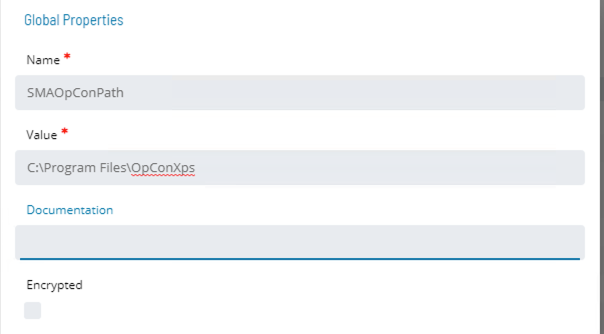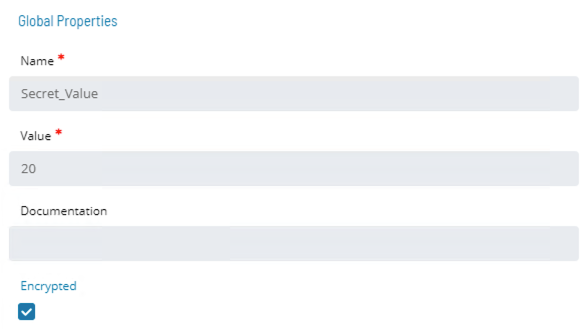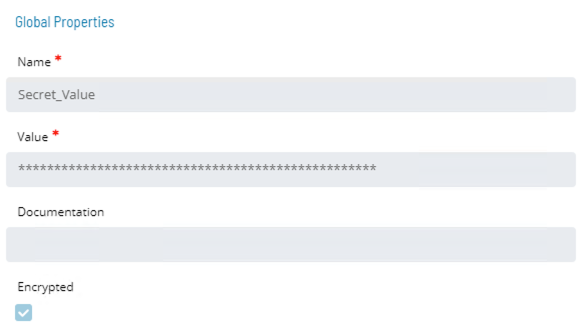Properties
- Global Properties are variables stored in the database that can be used throughout OpCon
- Properties are defined with a name and a value
To use a Global Property in OpCon (Command Lines, Events, etc.) use the following notation:
[[<Global Property Name>]]
Example:
[[PATH-TO-SCRIPTS]]
OpCon will replace the Global Property with the given value at Runtime
The Global Properties screen is used to manage OpCon Instance Properties that apply to the entire environment
Troubleshooting Global Properties
- Job Stays On Hold
- If SAM is unable to Resolve a Property, it will place the Job “On Hold” at Runtime
- Both the SAM and Critical Logs will report which Property has an error
Encrypted Global Property
The Value of a Global Property can be Encrypted by simply checking the Encrypted check box and saving the Global Property
This value is decrypted by LSAM at Runtime
There is no decrypt option
Good for things like passwords
In Solution Manager, Global Properties is found in Library > Administration > Global Properties
Add New Global Property

Global Properties in Command Line

Encrypted Global Properties


System Properties
Properties are variables stored in the database that can be used throughout OpCon
- Defined with name and value
- Global Properties (OpCon Instance Properties) are variables associated with the entire environment
- Job Instance Properties are variables associated with a specific Job
- Schedule Instance Properties are variables associated with a specific Schedule
- Machine Instance Properties are variables associated with a specific Machine
System Properties vs User Defined Properties
- All Global Properties that begin with a dollar symbol (
$) are known as System Properties - System Properties give variable values dependent on the System
- Many of these system values can be format modified
- Example:
$DATEcan be set tommddyy,yyyymmdd,mm, etc.
- Example:
$DATEis the current date of the OpCon server$SCHEDULE DATEis the date a Schedule was built- If a Schedule is built for January 1st at 23:50, but runs until January 2nd at 3:30, all
$SCHEDULE DATEproperties will be resolved to January 1st date
- If a Schedule is built for January 1st at 23:50, but runs until January 2nd at 3:30, all
System Properties Offsets
$DATEor$SCHEDULE DATESystem Properties can be offsetExample:
[[$DATEmmddyy(+1d)]]or[[$DATEmmddyy(-1d)]]for day offsets
Offset Day
[[$DATEmmddyy(+1d)]]or[[$DATEmmddyy(-1d)]]for day offsets
Offset Working Day
[[$SCHEDULE DATEmmddyy(+1wd)]]or[[$SCHEDULE DATEmmddyy(-1wd)]]for * Working Day offsets$SCHEDULE DATErequired for this Working Day offset
Offset Month
[[$DATEmmddyy(+1m)]]or[[$DATEmmddyy(-1m)]]for day offsets- No offset specific for year – Use
(+12m)or(-12m)to offset years
- No offset specific for year – Use
End of Month
[[$DATEmmddyy(+1eom)]]Value finds the last day of current month+1is current month+2is next month
[[$DATEmmddyy(-1eom)]]Value finds the last day of previous month
Global Properties List

System Properties in Command Line

Job Instance Properties
- Job Master contains an Instance Definition tab for each individual Job where Job Instance Properties can be defined or modified
- Use of a Job Instance Property must contain "
JI." in front of the Property name (e.g.,[[JI.Path]])- Identifies a Property as a Job Instance Property
Schedule Instance Properties
- Use of a Schedule Instance Property must contain "
SI." in front of a Property name (e.g.,[[SI.ID]])- Identifies a Property as a Schedule Instance Property
Schedule Instance Definition
- Instance Definitions can be created or modified within the Schedule Build Wizard
- Property names can be defined for single-instance Schedules
- Named Instances can be selected or defined for multi-instance Schedules
Machine Instance Properties
- Advanced Machine Properties screen is used to manage Machine Instance Properties of a specific Machine
- Use of a Machine Instance Property must contain "
MI." in front of a Property name (e.g.,[[MI.LSAMpath]]) - Identifies a Property as Machine Instance Property
- Communication to a Machine within OpCon must be Stopped to add or modify Machine Instance Properties
Machine Instance Properties are case sensitive ::::